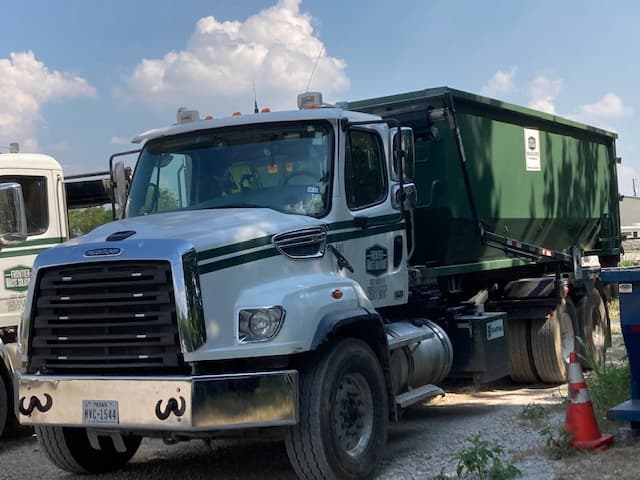Homeowners and businesses face a common problem when dealing with unwanted items and debris. Two main options exist: renting a dumpster or hiring a junk removal service. Each approach works better for different situations and budgets.
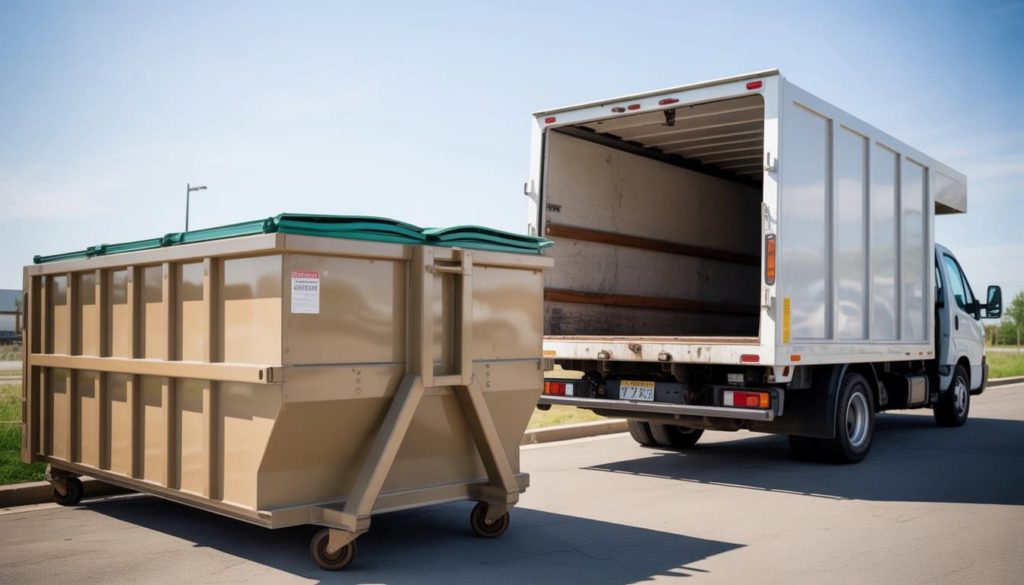
Dumpster rentals give you control over timing and allow you to work at your own pace, while junk removal services handle all the heavy lifting but cost more per item. The choice depends on factors like project size, physical ability, and how much hands-on work you want to do.
Making the wrong choice can waste hundreds of dollars or create major headaches during your cleanup project. This guide breaks down the real costs, time commitments, and practical considerations to help you pick the right service for your specific needs.
Which Service Fits Your Situation Best
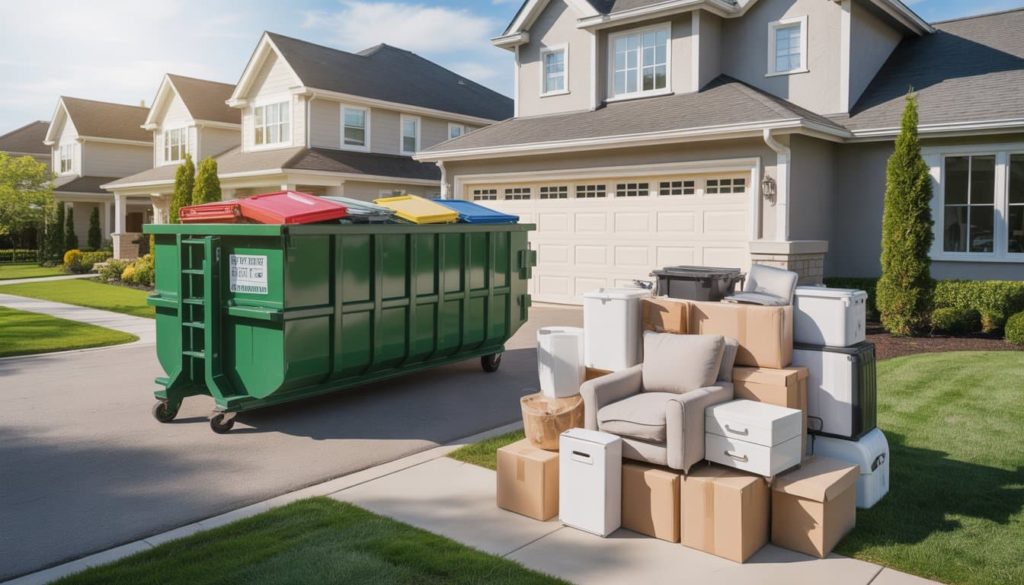
The choice between dumpster rental and junk removal depends on your project timeline, labor availability, and the type of waste you’re handling. Each service works better for different scenarios based on cost, convenience, and control factors.
Core Differences
Control and timing separate these services most clearly. Dumpster rentals give you complete control over the disposal timeline. You fill the container at your own pace over several days or weeks.
Junk removal services work on their schedule. They arrive, load everything, and leave within hours. You lose timing control but gain immediate results.
Labor requirements create another major difference. Dumpster rentals require you to load all materials yourself. This means lifting, carrying, and organizing debris into the container.
Junk removal teams handle all physical labor. They enter your space, collect items, and carry everything to their truck. You simply point out what needs removal.
Cost structures work differently for each service. Dumpster rentals charge flat rates based on container size and rental period. Additional fees apply for permit requirements or weight overages.
Junk removal services price by volume and labor time. They charge more for heavy items, difficult access, or hazardous materials requiring special handling.
Typical Use-Cases
Dumpster rentals work best for extended projects where debris accumulates over time. Home renovations generate steady waste streams that fill containers gradually.
Construction debris removal represents the ideal dumpster scenario. Contractors need reliable disposal access throughout multi-week projects. They control loading schedules and manage different material types efficiently.
Junk removal services excel at one-time cleanouts requiring immediate results. Estate sales, moving preparations, and garage cleanouts fit this category perfectly.
Business relocations often require junk removal services. Companies need quick turnarounds without dedicating employee time to disposal tasks. Professional teams handle furniture, electronics, and office equipment safely.
Accessibility issues influence service selection significantly. Properties with narrow driveways, overhead obstacles, or weight restrictions may prevent dumpster placement. Junk removal teams navigate these challenges with smaller vehicles and manual labor.
Example Scenarios
Kitchen renovation project: A homeowner plans a three-week kitchen remodel. Dumpster rental provides the better solution because demolition waste, old cabinets, and construction debris accumulate gradually. The fixed timeline and predictable waste volume make flat-rate pricing advantageous.
Elderly parent’s house clearance: Adult children need to empty their deceased parent’s home quickly for sale. Junk removal service handles this situation better because it provides immediate results, professional sorting, and eliminates physical strain on family members.
Small bathroom upgrade: A weekend DIY project generates limited waste from tile removal and fixture replacement. Junk removal service costs less than minimum dumpster rental periods for such small volumes.
New construction project: Builders managing month-long construction schedules benefit from dumpster rentals. They control loading timing, separate different material types, and avoid multiple service calls throughout the project duration.
Cost Breakdown You Can Actually Compare
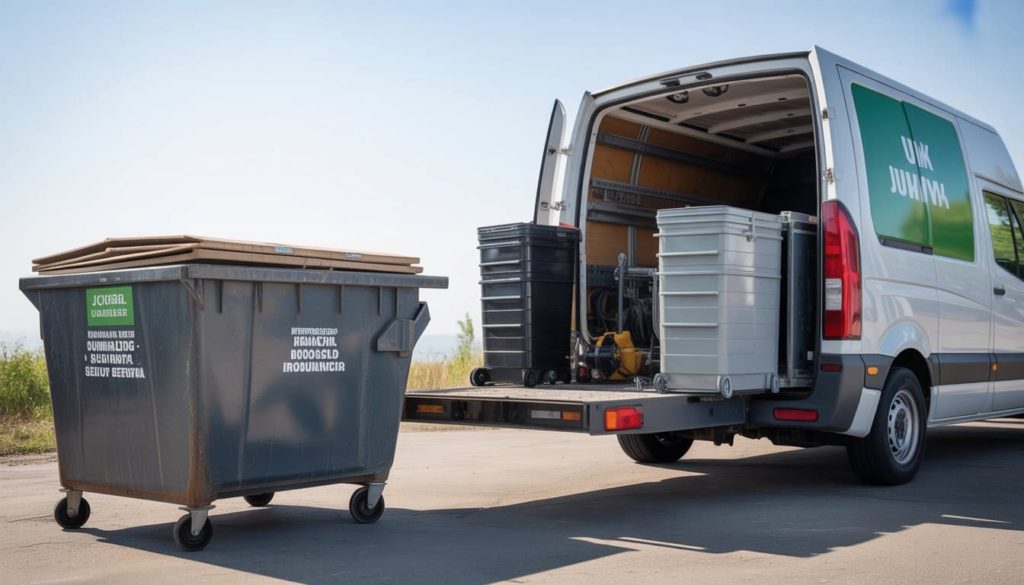
Dumpster rental typically charges flat weekly rates while junk removal companies price by volume and labor. Project size affects both services differently, with dumpsters favoring larger jobs and junk removal working better for smaller loads.
Typical Price Ranges And Pricing Structures
Dumpster Rental Costs:
- 10-yard dumpster: $300-400 per week
- 20-yard dumpster: $400-500 per week
- 30-yard dumpster: $500-600 per week
Most companies include delivery, pickup, and waste disposal in their base price. Weekly rental periods are standard across Texas.
Junk Removal Cost Structure:
- Minimum charge: $150-200
- Single item pickup: $75-150
- Full truck load: $400-800
Junk removal services charge by volume using truck space measurements. A quarter truck costs less than a half truck, which costs less than a full truck load.
Labor and fuel surcharges may apply to both services. Dumpster companies charge extra for overage weight or extended rental periods.
How Costs Shift Depending On Project Size
Small Projects (1-2 rooms):
Junk removal wins on price for small waste volume jobs. A quarter truck removal costs $200-300 compared to a $400 dumpster rental minimum.
Most homeowners generate less waste than expected during small cleanouts. Paying for unused dumpster space wastes money.
Medium Projects (whole house cleanout):
Dumpster rental becomes cost-effective at this waste volume level. A 20-yard dumpster handles most residential cleanouts for $450.
Junk removal for the same project requires multiple trips or a full truck, costing $600-800 total.
Large Projects (construction/renovation):
Dumpsters clearly beat junk removal for construction waste disposal. Multiple junk removal trips would cost thousands compared to one dumpster rental.
Common Hidden Fees
Dumpster Rental Hidden Costs:
- Overage fees: $50-100 per ton over weight limit
- Extended rental: $10-15 per day beyond included period
- Permit fees: $50-100 for street placement
- Fuel surcharges during high gas prices
Junk Removal Hidden Fees:
- Stairs or difficult access: $50-100 extra
- Hazardous materials: $25-75 per item
- Same-day service: 20-30% premium
- Travel time for rural locations
Both services exclude certain materials. Electronics, paint, and chemicals require special waste disposal at additional cost.
| Project Size | Dumpster Rental | Junk Removal |
|---|---|---|
| Small (1-2 rooms) | $400-500 | $200-300 |
| Medium (whole house) | $450-550 | $600-800 |
| Large (construction) | $500-700 | $1000+ |
Prices include typical waste volume for each project type in Texas markets.
The chart shows the crossover point where dumpster rental becomes more economical. Small waste removal jobs favor junk removal while larger waste disposal projects favor dumpsters.
Time, Effort, And Scheduling
Dumpster rental requires more personal involvement and time commitment from property owners. Junk removal services handle everything with minimal effort from customers but operate on tighter schedules.
Dumpster Rental
Dumpster rental demands significant time investment from start to finish. Customers spend hours researching sizes, comparing prices, and scheduling delivery dates.
The rental period typically lasts 7-14 days. During this time, property owners must load all debris themselves. Heavy furniture, appliances, and construction materials require physical strength and proper lifting techniques.
Loading responsibilities include:
- Sorting materials by type
- Breaking down large items
- Stacking debris efficiently
- Ensuring weight limits aren’t exceeded
Project duration extends based on available free time. Weekend warriors often take weeks to fill containers. Busy homeowners may need month-long rentals to complete cleanouts.
Weather delays add extra days to projects. Rain stops outdoor work completely. Snow makes dumpster access dangerous.
Pickup scheduling requires coordination with rental companies. Most providers offer flexible pickup dates within the rental period. Extended rentals cost additional daily fees.
Junk Removal
Professional junk removal eliminates physical effort for customers. Trained crews handle all lifting, loading, and hauling tasks within hours.
Scheduling appointments takes minutes through phone calls or online booking. Most companies offer same-day or next-day service availability.
Service timeline breakdown:
- Initial consultation: 15 minutes
- Arrival window: 2-4 hours
- Actual removal: 1-3 hours
- Total project time: Same day completion
Junk removal services work in any weather condition. Crews arrive equipped with proper gear and safety equipment. Rain or shine doesn’t affect scheduled appointments.
No sorting requirements exist for customers. Professional teams separate recyclables, donations, and disposal items automatically. This saves hours of preparation time.
Emergency cleanouts get priority scheduling. Estate sales, moving deadlines, and property inspections receive immediate attention from most providers.
Flexibility Vs. Convenience
Dumpster rental offers maximum flexibility with timing and loading pace. Customers control when debris gets added and removed from containers.
Extended rental periods accommodate busy schedules. Working professionals can load containers gradually over weekends and evenings.
Junk removal services prioritize convenience over flexibility. Appointments must fit within company operating hours, typically 8 AM to 6 PM on weekdays.
Scheduling comparison:
| Service Type | Flexibility | Convenience | Time Investment |
|---|---|---|---|
| Dumpster Rental | High | Low | 20-40 hours |
| Junk Removal | Low | High | 2-4 hours |
Rush jobs favor junk removal services significantly. Moving deadlines and property sales require immediate completion. Dumpster rentals cannot match this speed.
Budget-conscious customers prefer dumpster flexibility. Longer loading periods reduce labor costs substantially.
Other Factors That Can Tip The Scale
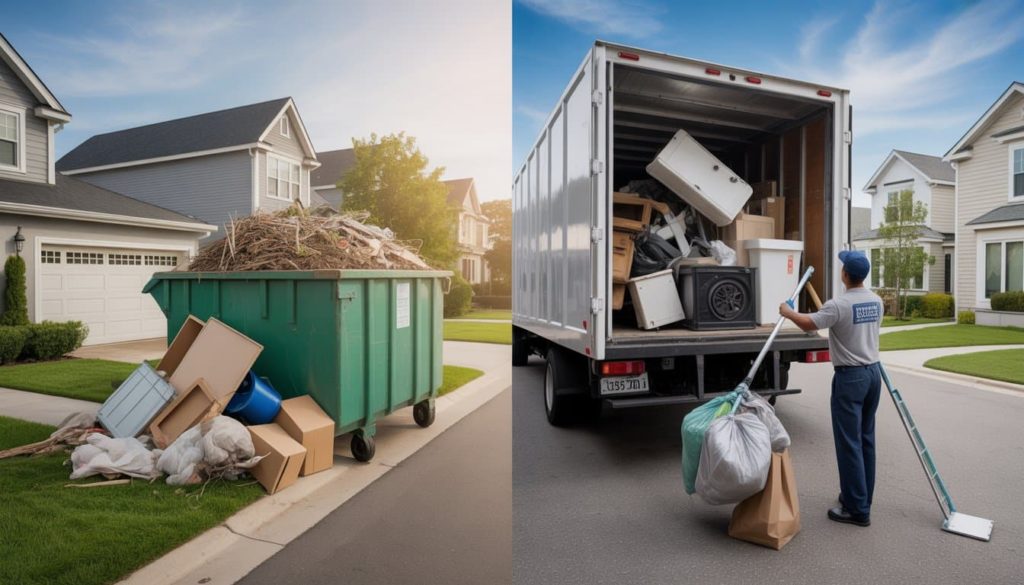
Several practical considerations beyond cost and convenience can determine which waste solution works best. These factors include space availability, control over belongings, environmental concerns, and effects on neighbors.
Space Requirements
Dumpster rentals demand significant physical space for delivery and placement. Most residential driveways can accommodate 10-yard containers, but larger sizes require street permits or alternative locations.
The container stays on-site for days or weeks. This blocks parking spaces and creates obstacles for vehicles and pedestrians.
Junk removal services eliminate space concerns entirely. Crews arrive with their own trucks and take items directly from inside homes or garages. No advance space preparation is needed.
Property owners with narrow driveways, HOA restrictions, or limited street access often find junk removal more practical. Urban areas with parking challenges particularly benefit from this approach.
Item Control
Dumpster rentals provide complete control over which items get discarded and when. Users can sort through belongings at their own pace and retrieve items if needed.
The container remains accessible throughout the rental period. This flexibility helps with projects where decisions about keeping items change over time.
Junk removal services work differently. Crews typically sort and remove items quickly during scheduled appointments. Once items leave the property, retrieval becomes impossible.
Some people prefer having professionals handle heavy lifting and removal decisions. Others want to maintain personal oversight of the disposal process.
Environmental Impact
Both services offer different waste disposal methods that affect environmental outcomes. Dumpster contents usually go to single destinations based on the rental company’s contracts.
Many junk removal companies actively sort materials during collection. They donate usable items to charities and route recyclables to appropriate facilities.
Waste management practices vary significantly between providers. Some prioritize landfill diversion while others focus on cost efficiency.
| Service Type | Recycling Rate | Donation Potential | Waste Sorting |
|---|---|---|---|
| Dumpster Rental | 15-25% | Limited | Customer responsibility |
| Junk Removal | 40-60% | High | Professional sorting |
Neighborhood Impact
Dumpsters create visible changes to neighborhood appearance. Large containers on streets or driveways can draw complaints from neighbors or HOA violations.
The extended presence affects traffic flow and street aesthetics. Some communities restrict dumpster placement during certain hours or events.
Junk removal services minimize neighborhood disruption. Trucks arrive and depart within hours, reducing visual and parking impacts.
Physical capabilities of homeowners also influence neighborhood dynamics. Elderly residents or those with mobility limitations may struggle with dumpster access.
Finding Your Match
The right choice depends on your specific project needs and personal preferences. These questions help identify which service fits your situation best.
Decision Guide Questions
Project Type and Timeline
- Will you generate debris over several days or weeks?
- Do you need immediate pickup of existing junk?
- Can you safely lift and move items yourself?
Volume and Space
- How much waste will you create?
- Do you have driveway or street space for a container?
- Will neighbors or HOA rules allow temporary dumpster placement?
Budget Considerations
- Do you prefer paying upfront with no surprises?
- Would you rather pay per service visit?
- Can you dedicate time to load items yourself?
Physical Requirements
- Are you comfortable lifting heavy objects?
- Do items need to come from inside your home?
- Will you need help moving furniture or appliances?
Recommendation Based On Answers
| Choose Dumpster Rental If: | Choose Junk Removal If: |
|---|---|
| Project spans multiple days | Need same-day service |
| You can lift items safely | Items are heavy or awkward |
| Have space for container | Limited driveway access |
| Want lower overall costs | Prefer full-service option |
| Debris comes from construction | Junk is inside your home |
Quick Budget Guide
Small cleanouts under 10 items work better with junk removal. Large projects with debris over 2-3 pickup truck loads cost less with dumpster rental.
Space Requirements
Dumpsters need 60 feet of clear driveway access. Junk removal only requires street parking for the crew’s truck.
Start Here: What’s Your Main Need?
↓ Ongoing project with debris → Dumpster Rental
↓ One-time junk pickup → Continue
↓ Can you load items yourself?
- Yes → Check space for dumpster
- No → Junk Removal Service
↓ Have driveway space?
- Yes → Dumpster Rental
- No → Junk Removal Service
Final Check Questions:
- Timeline flexible? → Dumpster
- Need it gone today? → Junk Removal
- Want cheapest option? → Dumpster
- Want easiest option? → Junk Removal
Combining Both For Maximum Efficiency

Smart property managers use dumpster rentals for debris and junk removal services for heavy lifting during large-scale cleanouts. This hybrid approach cuts costs by 30-40% while reducing project time by half.
How Hybrid Cleanouts Work
The hybrid method splits tasks based on what each service handles best. Homeowners rent a dumpster for lightweight debris like cardboard, paper, and small broken items.
Professional junk removal teams handle heavy appliances, furniture, and hazardous materials. They also tackle items in hard-to-reach spaces like attics or basements.
Timeline breakdown:
- Day 1: Dumpster delivery and light debris removal
- Days 2-3: Homeowner fills dumpster with small items
- Day 4: Junk removal team handles heavy items
- Day 5: Dumpster pickup
This method works especially well for estate cleanouts, moving preparation, and renovation projects. The dumpster stays on-site for convenience while professionals handle the difficult work.
Example Of Cost And Time Savings
A typical garage cleanout using only junk removal costs $800-1,200. The hybrid approach costs $450-700 for the same project.
Cost comparison for 3-car garage cleanout:
| Method | Dumpster | Junk Removal | Total Cost | Time |
|---|---|---|---|---|
| Junk removal only | $0 | $1,000 | $1,000 | 6 hours |
| Hybrid approach | $300 | $350 | $650 | 4 hours |
The hybrid method saves $350 and two hours. Large-scale cleanouts show even bigger savings because homeowners handle more items themselves.
A whole-house cleanout typically saves $500-800 using this combined approach. The time savings come from parallel work – filling the dumpster while scheduling junk removal.
What Goes Where List
Dumpster items:
- Boxes and packaging materials
- Small broken furniture pieces
- Clothing and textiles
- Paper documents and books
- Small electronics (non-hazardous)
Junk removal items:
- Large appliances (refrigerators, washers, dryers)
- Heavy furniture (couches, dressers, mattresses)
- Exercise equipment
- Hot tubs and pool equipment
- Construction debris over 50 pounds
Neither service handles:
- Hazardous chemicals
- Paint and solvents
- Batteries
- Medical waste
- Asbestos materials
Electronics like TVs and computers can go with either service, but junk removal companies often provide better recycling options. Heavy items that require two people should always go with the removal team to prevent injury.
Booking Checklist To Avoid Surprises
Smart planning prevents costly mistakes when choosing between dumpster rental companies and junk removal services. Getting clear details upfront saves money and eliminates hidden fees.
Accurate Load Estimate
Getting the right size container or service crew starts with honest measurements. Customers should walk through their space and list every item going out.
For dumpster rentals, measure furniture dimensions and count bags of debris. A 10-yard container holds about three pickup truck loads. A 20-yard fits six truck loads.
For junk removal services, take photos of items and send them to companies for quotes. Most junk removal companies offer free estimates based on volume and weight.
Weight matters more than size for both options. Construction debris weighs much more than household items. Concrete and dirt can max out weight limits quickly.
Create a detailed list before calling. Include appliances, furniture pieces, and estimated bags of smaller items. This helps companies give accurate pricing upfront.
Transparent Pricing
Hidden fees turn budget-friendly quotes into expensive surprises. Ask for itemized pricing that shows every possible charge.
Dumpster rental companies often charge extra for:
- Delivery and pickup fees
- Daily rental rates beyond included days
- Overage fees for weight or volume
- Fuel surcharges
- Environmental fees for certain materials
Junk removal services typically charge for:
- Labor time beyond estimates
- Heavy item surcharges
- Disposal fees for hazardous materials
- Stairs or difficult access fees
Get everything in writing before booking. Compare total costs, not just base prices. Some companies advertise low rates but add multiple fees later.
Ask about price matching policies. Many waste management companies will match competitor quotes if presented upfront.
Permit Requirements
Local regulations determine when permits are needed for dumpsters on public property. Skip this step and face fines or forced removal.
Driveway placement usually requires no permits since it stays on private property. Street placement almost always needs city approval and fees.
Contact your city hall or check their website for permit requirements. Applications often take 3-5 business days for approval. Rush permits cost extra.
Permit fees range from $25 to $200 depending on location and duration. Some cities require traffic cones or warning signs around street-placed containers.
Junk removal companies handle pickup from private property and don’t need permits. This makes them simpler for customers who want to avoid paperwork.
Homeowner associations may have rules about dumpster placement even on private property. Check HOA guidelines before booking.
Recycling And Donation Policies
Different companies have varying policies for recyclable and donatable items. These policies affect pricing and environmental impact.
Many junk removal companies sort items and donate usable furniture, appliances, and clothing. This service often costs less than straight disposal since donations reduce landfill fees.
Dumpster rental companies typically don’t sort mixed loads. Everything goes to the same disposal facility. Customers must separate recyclables themselves.
Prohibited items vary by company but usually include:
- Paint and chemicals
- Batteries and electronics
- Tires and automotive fluids
- Appliances with refrigerants
Ask about electronics recycling programs. Some companies partner with certified e-waste facilities for safe disposal of computers and TVs.
Availability And Schedule
Busy seasons and popular service areas book up quickly. Spring cleaning months and summer renovation periods have the highest demand.
Dumpster rentals offer more flexible timing. Most companies deliver within 24-48 hours and allow 7-14 day rental periods. Extensions are usually available for daily fees.
Junk removal services work on tighter schedules. Peak times fill up weeks in advance. Same-day service costs extra and isn’t always available.
Book 5-7 days ahead for standard service. Emergency cleanouts or estate sales may need rush scheduling at premium rates.
Confirm delivery windows and pickup times in writing. Some companies give 4-hour windows while others offer more specific timing.
Weather delays can affect both services. Have backup dates ready during storm season or winter months.
Dumpster Rental vs. Junk Removal
Both dumpster rentals and junk removal services solve waste disposal problems. The right choice depends on your specific needs and budget.
Choose dumpster rental if you:
- Have ongoing projects lasting several days or weeks
- Want to work at your own pace
- Need to dispose of large amounts of debris
- Prefer lower overall costs
Choose junk removal if you:
- Need immediate pickup and disposal
- Have limited physical ability to load items
- Want zero effort on your part
- Don’t mind paying premium prices for convenience
Budget plays a major role in most decisions. Dumpster rentals typically cost 30-50% less than full-service junk removal.
Time constraints matter too. Junk removal companies can often complete jobs within 24 hours. Dumpster rentals require advance planning and scheduling.
Ready to tackle your waste disposal project? Contact Frontier Waste Solutions today for a free quote. Our team helps Texas residents and businesses choose the best solution for their specific needs. We provide transparent quotes with no hidden fees.
Our experienced staff can assess your project and recommend the most cost-effective option. Don’t let waste pile up any longer.
Get your free estimate today and see why thousands of Texans trust Frontier Waste Solutions for their disposal needs.
Frequently Asked Questions
Customers often ask about costs, pickup schedules, and size requirements when choosing between dumpster rental and junk removal services. Local companies typically offer better pricing and faster response times than national chains.
What factors determine the cost of renting a dumpster for a day?
Dumpster size affects the daily rental rate most. A 10-yard container costs less than a 30-yard unit.
Location plays a major role in pricing. Urban areas typically charge more than rural locations due to higher delivery costs.
Weight limits impact the total price. Exceeding the included weight allowance results in additional fees per ton.
Rental duration changes the daily rate. Most companies offer better rates for weekly rentals compared to single-day service.
How do pricing and services compare between dumpster rental and professional junk removal?
Dumpster rental costs between $300-$600 for a week-long rental. Customers load debris themselves at their own pace.
Junk removal services charge $150-$800 per pickup. The price depends on truck capacity and labor requirements.
Professional junk removal includes loading, hauling, and disposal. Customers save time but pay more for convenience.
Dumpster rental works better for large projects lasting several days. Junk removal suits one-time cleanouts completed in hours.
What size of dumpster is typically required for home driveway projects?
A 20-yard dumpster handles most residential driveway demolition projects. This size holds approximately 8-10 tons of concrete and asphalt.
Small driveways under 500 square feet need a 15-yard container. Larger driveways over 1,000 square feet require a 30-yard dumpster.
Concrete weighs significantly more than other debris. A single-car driveway produces 3-5 tons of concrete waste.
Can you schedule same-day pickup with junk removal services?
Most junk removal companies offer same-day service Monday through Friday. Weekend availability varies by company and location.
Emergency pickups cost 20-30% more than scheduled appointments. Companies prioritize next-day service for standard rates.
Peak seasons like spring and summer reduce same-day availability. Customers should call early in the morning for best results.
Some companies guarantee same-day pickup for additional fees. Others operate on a first-come, first-served basis.
Are there specific materials prohibited from being placed in a rented dumpster?
Hazardous materials cannot go in rental dumpsters. This includes paint, chemicals, batteries, and automotive fluids.
Electronics require special disposal methods. Televisions, computers, and appliances need separate recycling programs.
Tires are banned from most dumpsters due to landfill restrictions. Tire shops accept old tires for proper recycling.
Medical waste and asbestos need specialized disposal companies. These materials pose health risks and require certified handling.
What are the advantages of choosing a local company for renting a dumpster or junk removal?
Local companies respond faster to service requests. They typically offer same-day or next-day delivery within their coverage area.
Regional pricing often beats national chain rates. Local businesses have lower overhead costs and pass savings to customers.
Customer service improves with local companies. Clients speak directly with local staff who understand area-specific needs.
Flexible scheduling becomes easier with nearby providers. Local companies accommodate rush jobs and extended rental periods more readily.


